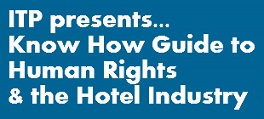 LONDON—To mark Human Rights Day 2014, the International Tourism Partnership (ITP) has released its latest Know How Guide on Human Rights and the Hotel Industry. The guide is a high-level introduction to human rights for the hotel industry—what human rights are, what they are in the context of the hotel industry, steps to implement the UN Guiding Principles and resources for further reading. Hotels touch every corner of the globe and employ and offer hospitality to millions of people very year. The hotel industry therefore has an important role to play when it comes to human rights and it is imperative that hotel companies understand the relevant issues.
LONDON—To mark Human Rights Day 2014, the International Tourism Partnership (ITP) has released its latest Know How Guide on Human Rights and the Hotel Industry. The guide is a high-level introduction to human rights for the hotel industry—what human rights are, what they are in the context of the hotel industry, steps to implement the UN Guiding Principles and resources for further reading. Hotels touch every corner of the globe and employ and offer hospitality to millions of people very year. The hotel industry therefore has an important role to play when it comes to human rights and it is imperative that hotel companies understand the relevant issues.
Human rights are often dismissed as too complicated or irrelevant. The International Tourism Partnership’s aim is to demystify human rights for the hotel industry—bringing together a complex mass of information into one document specifically for the sector. Human rights needn’t be complicated, or abstract. If they are embedded into a hotel’s strategy and operations correctly, it will be of equal benefit to employees, stakeholders and guests.
The guide features some hotel policies on human rights from ITP members and a list of key human rights issues in hotels, including the following:
• Right to work—Are you providing jobs for local communities and contributing to the local economy?
• Labor conditions—Are your staff well-treated?
• Land rights and forced displacement—Has your hotel siting denied local people access to their land?
• Forced labor—How well are your agency workers treated? Can you be sure they are not being exploited?
• The right to water and sanitation—Are you enhancing the drinking water availability for the local area? Or is your hotel’s consumption of water at the expense of others?
• The right to life and health—How do you ensure staff wellbeing?
• The right to dignity and privacy—How do you protect the privacy of your guests?
• Economic impacts—How are you giving back to the local communities through employment and supply chains? Are you paying suppliers and workforce fairly?
• Cultural impacts—Are you providing a center for community involvement that enables positive and shared cultural experiences? Or do you provide excursions that exploit local communities?
• Child labor—Are any of the goods or services you use the product of child labor?
• Sexual exploitation—Are your premises used to sexually abuse adults or children?
• The right to participate—Do your workers have a voice?
Human Rights Day was established by the UN in 1950, and has taken place every year on December 10 ever since. This year’s slogan, Human Rights 365, encompasses the idea that every day is Human Rights Day. It celebrates the fundamental proposition in the Universal Declaration that each one of us, everywhere, at all times is entitled to the full range of human rights, that human rights belong equally to each of us and bind us together as a global community with the same ideals and values.
Go to the International Tourism Partnership.






